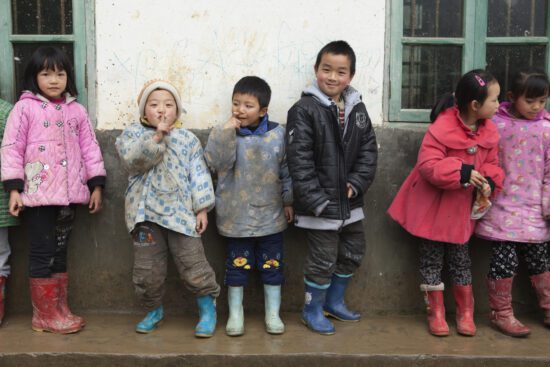There are so many unknowns when you have kids. Whether you are biological parents, adopting, fostering, or even like me, babysitting someone else’s kids, you are regularly reminded that things are beyond your control. Kids get hurt; kids sin; you sin; things don’t go according to plan. Over and over, you’re confronted with the need for God’s sovereignty, grace, and control as you work with kids.
This is especially evident in foster care, as the entire extent of fostering contains many questions. There are many concerns that can arise. Who is the child we are bringing into our home? What trauma have they experienced? What decisions will the court make? Will they be reunified with their biological family? How long will they be with us? How do we best help them with the time we have with them?
The unknown is often scary, but many good things would be missed if we avoided anything that we were unsure of. As I’ve had the opportunity to watch some of my dearest friends parent, and now foster-parent, I sat down to ask them questions about being foster parents. I share our conversation with you for three purposes:
- That you would thank God for how he works through the foster system.
- That you would pray for all those involved in the foster care system.
- That what seems so unknown might become more familiar, and that the Church would include more foster parents in 10 years than it does now.
What led you to become foster parents?
We’ve always been very interested in adoption. We initially pursued international and domestic adoption but experienced varying challenges. Around that time, we read an article that stated there were over 30,000 children in the foster care system in our area who needed homes. After seeking counsel and praying through the option to foster, we decided to step forward in faith despite our fears.
What concerns did you have to work through before you signed up?
We were worried about the “normal” things like the pain and sadness that would accompany loving and bonding with a child and then having that child be reunified with his birth family. But we were actually most concerned with how foster care would affect our two biological children. We were worried that they wouldn’t understand how fostering worked, and that they would be damaged by the instability of it all. We still worry at times about that as we’ve now had our foster son for close to two years. It has been hard for them as we talk about reunification, but the good has far outweighed the bad. Our kids, through this process, have learned to love and serve even when they gain nothing in return. We’ve had honest conversations with them about family, love, anger, loss, and much more.
What inefficiencies or ineffective policies have you observed in your experience with foster care?
Many areas of the foster care system are in need of reform. The current system doing its best to serve these children who desperately need protection and love, but at times it falls short. There are so many inefficiencies. As someone who loves efficiency, it’s been a continual reminder that our world is broken and desperately needs Jesus. Some of the inefficiencies are found in the court process. Many social workers are overworked and worn out. But, we have chosen to foster through the system, so we try not to complain about the problems or inefficiencies, and do our best to abide by the policies even though they may not seem best to us.
What specific challenges have you faced throughout fostering?
After initially having our foster son placed with us, we had to help him work through his extreme fears of being abandoned. We have walked through being falsely accused of horrendous abuse by his family and potentially having the safety of our biological children endangered. We've ridden the rollercoaster of the promise that our foster child would be adopted by Christmas, and then a few weeks later being told that the county was trying to find a new foster family for him because his birth mother wanted him closer. Each week after our foster child’s visit with his mother, we have had to help him work through the range of extreme sadness, anger, and clinginess. It’s heartbreaking to see a child you deeply love be triggered by weekly visits with his mother. Now that he’s getting older, his clinginess has shifted more to anger. Our biological children are confused as to why his little personality is so different the days following his visits.
Foster care is one means of loving our neighbors and of caring for the orphan.
What have friends and family done that was helpful or unhelpful?
Jesus has been so kind to provide an incredible community to surround and support us. They’ve showered us in prayer, provided dozens of meals, and volunteered countless hours of childcare for trainings and court days. They’ve provided a listening ear for hard news and hard court decisions. They’ve dropped off baby supplies and offered playdates for our older two so we could bond with our foster son when he arrived. Our church has provided counsel and support through various groups and conferences. Honestly, we’ve had very few unhelpful friends and family. We’ve had some well-meaning friends ask insensitive questions about the future, but for the most part, our family and friends have been incredibly gracious and sensitive. We are so thankful for the body of Christ.
What have interactions with your foster child's family look like?
Our initial hope was to help and support our foster son’s birth mom in hopes of providing her the time and help she needed to break her addictions. Over time, however, it became apparent that she wasn’t interested in pursuing a relationship with us and made false accusations against us. We’ve been able to pursue relationships with our foster son’s grandmother and great-grandmother. And we are thankful for opportunities to redeem long court days by getting to sit and talk with them in the waiting room.
What has been the emotional toll on you and your family?
Initially, we had been able to lovingly care for this precious baby boy and love him while knowing and expecting him to reunify. However, as the months and now years have passed, it’s been more difficult to imagine not having him be a part of our family. Our case took a bit shift this past summer, and it’s been sad to still love him while knowing that it is very likely he’ll be returned to his birth mother. I think the hardest part of our experience with foster care is not just having a child we have loved for years be reunified with his birth family, but having him go back to an unsafe and unstable home because a broken system has made a decision that we don’t agree with. However, almost everything we have experienced, we knew about going into the process and were warned about by other foster parents and our agency.
What have you done to help your kids in the process?
We’re hoping and praying that the stability and safety we’ve provided for our little guy has given him a strong foundation. We know he cannot grasp that the God of the universe deeply loves and cares for him, but we’re hoping that through our care and love for him we have given him a small taste of that love. We’re also hoping that the comfort and care we provide after his visits is a reminder that he’s safe and loved. We’re actively working with him to better understand his emotions and proper ways to respond to his “big feelings.” He’s caught up, for the most part, developmentally and physically. We have been working with him on his speech development so that when he is reunified, he is able to communicate if he needs help or is hurting. We are doing everything we can to prepare him, even at a young age, to be reunified. If he were older, that would mean more conversations and preparing him for loss in a way that helps him transition and doesn’t make it harder on him even if the loss hurts and is hard on all of us.
For our biological kids who are a bit older, it has meant many honest conversations to explain reunification, court decisions, etc. We also have made it a point to have a family day around each of the court dates so court days aren’t dreaded days. We know one of these days they will likely lose a sibling they love and our foster son will lose his big siblings whom he loves. These days away give the entire family time together and allow us to do something fun during a hard few days.
What things can foster parents do to help the foster kid who gets reunited or moved to another home?
Honestly, we’ve racked our brains to figure how we can give him tools and sources of help after he’s reunified. We’ve come to realize that because he’s so young, if he’s reunified, he’ll likely forget us. As heartbreaking as that is, we’re comforted by the fact that our heavenly Father loves our sweet foster son more than we ever could, and that he has crafted a perfect story for our foster son that best honors him. So, in the meantime we rest in the knowledge that for the last year and a half, he’s been kept safe, he’s been loved, he’s been invested in, and that investment will, we hope, bear fruit in the future.
What has helped you as you have experienced sorrow in the fostering process?
We marvel at how people who don’t have the hope of the gospel walk through foster care. Our strength is rooted in the sovereignty of our good Father. We have seen how he’s used tragedy and hardship in our own lives to cause us to better understand him and to grow us. We’re praying that he uses this to cause us to trust him more. It has caused our prayer life to grow, and we’ve been forced to bank on the promises we’ve found in Scripture.
What have you learned through foster care?
Foster care is a daily reminder in our fairly “unbroken” life that we live in a very broken world. The Lord has placed us in a lovely community with a wonderful home, dear friends, and an amazing church. I could see how without fostering we’d be tempted to place our hope in the comforts that surround us. We’re also thankful for the way that it’s connected us to hurting people and the opportunities it’s provided to share the gospel. And most of all, we’re thankful for the opportunity it’s given us to love a little boy and his family in a way that can only be explained by the power of the gospel. We were worried that fear and self protection would keep us from fully loving and bonding with our foster son. However, the Lord has been kind to show us so much grace and has given us a deep, deep love for our foster son. We’re so thankful for that.
Conclusion
Foster care, like so much of the Christian life, is hard but good. Foster care is one means of loving our neighbors and of caring for the orphan. As my friend testified, families that participate in the process not only provide a loving home for a child, but they are changed by God in the process, too. It is an opportunity to trust in God’s promises while selflessly serving the vulnerable. Whether you have the opportunity to foster or not, you can join this important work by praying for the system, praying for the foster parents and kids you know, and by being good friends to foster parents in your church.










